Structure, Size and Scope of Hospitality Industry
VerifiedAdded on 2023/01/23
|13
|3508
|82
AI Summary
This assignment explores the structure, size and scope of the hospitality industry, focusing on event management companies. It discusses the different sectors within the industry, such as hotels and event planners, and their roles and responsibilities. The assignment also examines the skills required for successful event planning and the factors that influence the industry, including political, economic, social, and technological factors.
Contribute Materials
Your contribution can guide someone’s learning journey. Share your
documents today.
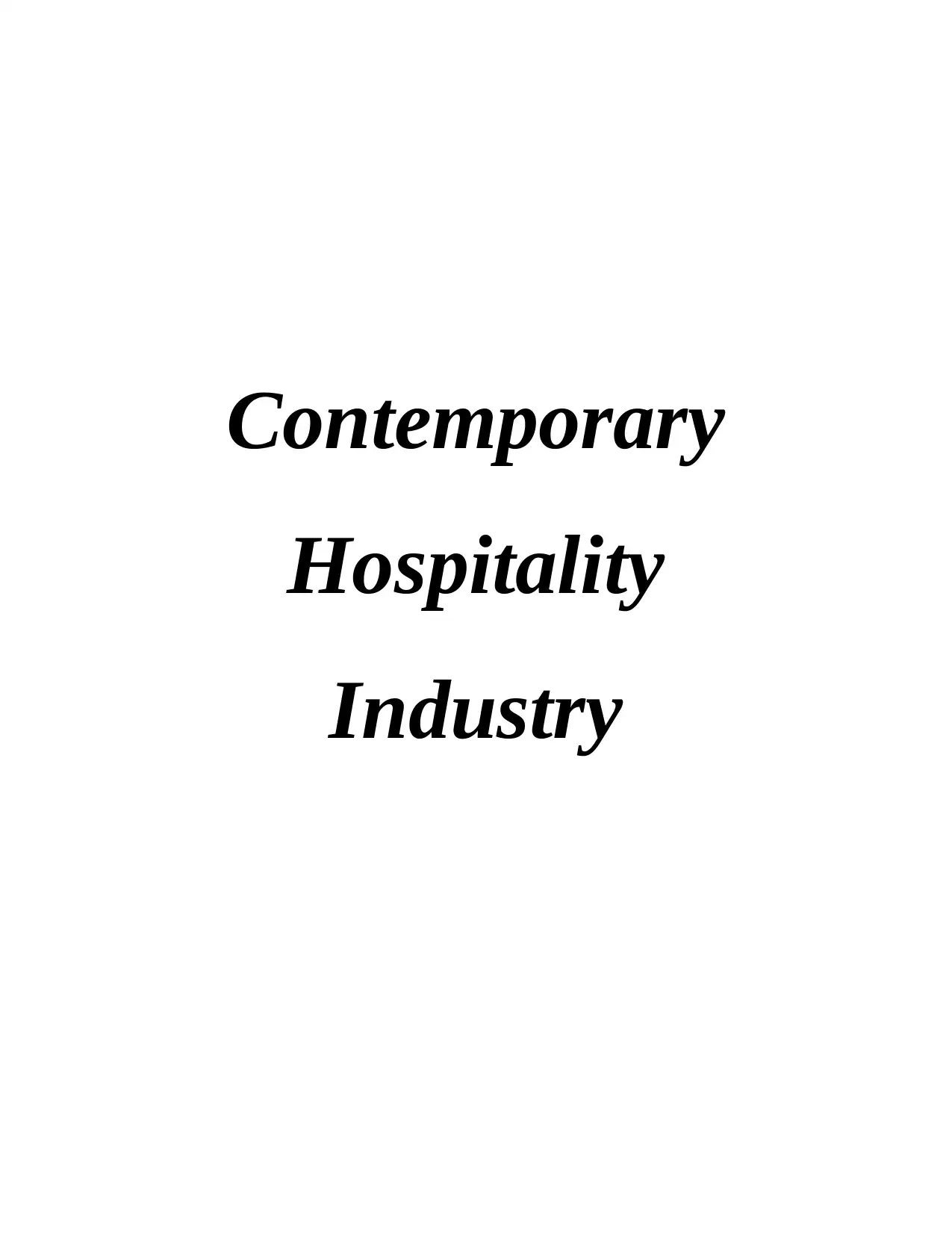
Contemporary
Hospitality
Industry
Hospitality
Industry
Secure Best Marks with AI Grader
Need help grading? Try our AI Grader for instant feedback on your assignments.
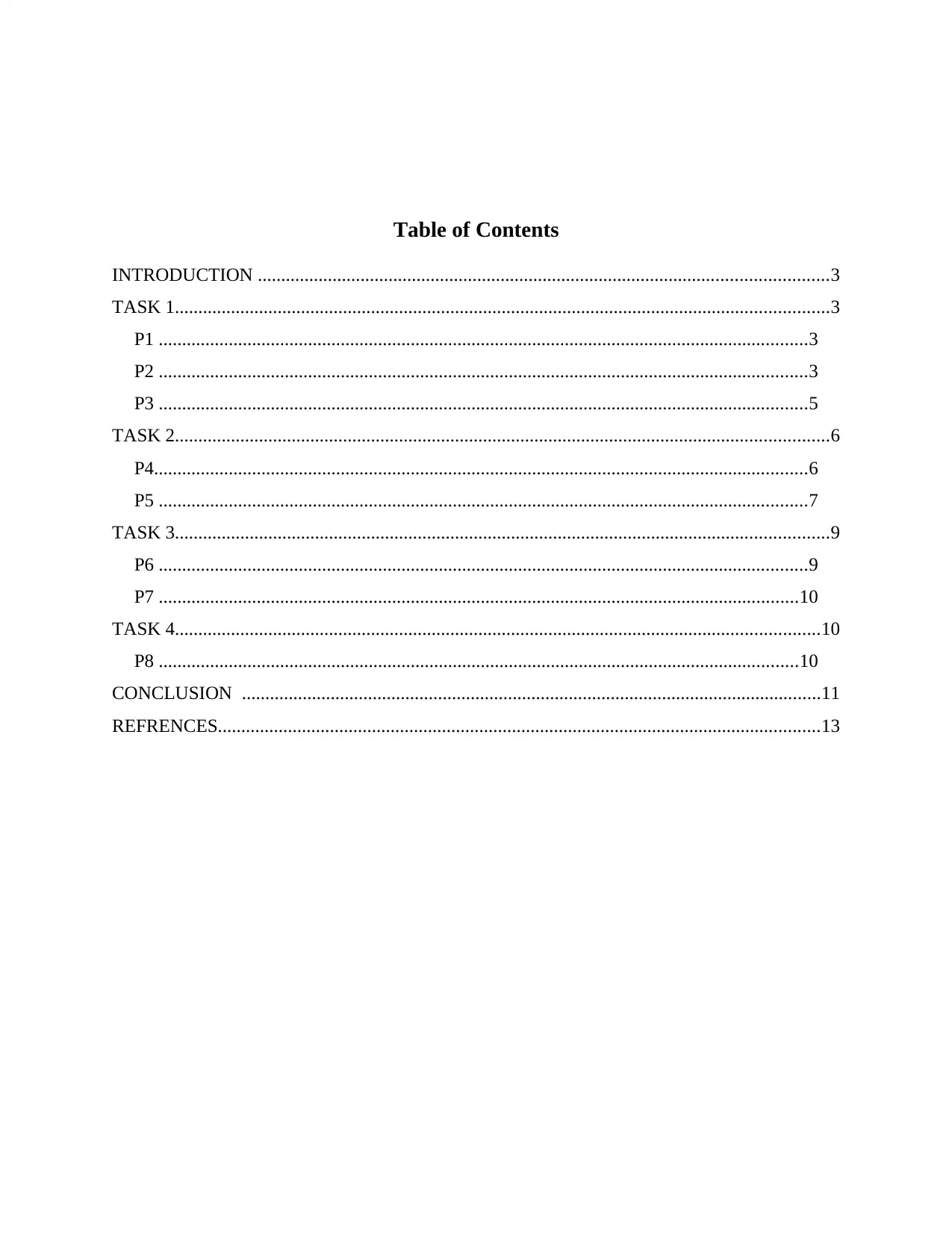
Table of Contents
INTRODUCTION ..........................................................................................................................3
TASK 1............................................................................................................................................3
P1 ...........................................................................................................................................3
P2 ...........................................................................................................................................3
P3 ...........................................................................................................................................5
TASK 2............................................................................................................................................6
P4............................................................................................................................................6
P5 ...........................................................................................................................................7
TASK 3............................................................................................................................................9
P6 ...........................................................................................................................................9
P7 .........................................................................................................................................10
TASK 4..........................................................................................................................................10
P8 .........................................................................................................................................10
CONCLUSION ............................................................................................................................11
REFRENCES.................................................................................................................................13
INTRODUCTION ..........................................................................................................................3
TASK 1............................................................................................................................................3
P1 ...........................................................................................................................................3
P2 ...........................................................................................................................................3
P3 ...........................................................................................................................................5
TASK 2............................................................................................................................................6
P4............................................................................................................................................6
P5 ...........................................................................................................................................7
TASK 3............................................................................................................................................9
P6 ...........................................................................................................................................9
P7 .........................................................................................................................................10
TASK 4..........................................................................................................................................10
P8 .........................................................................................................................................10
CONCLUSION ............................................................................................................................11
REFRENCES.................................................................................................................................13
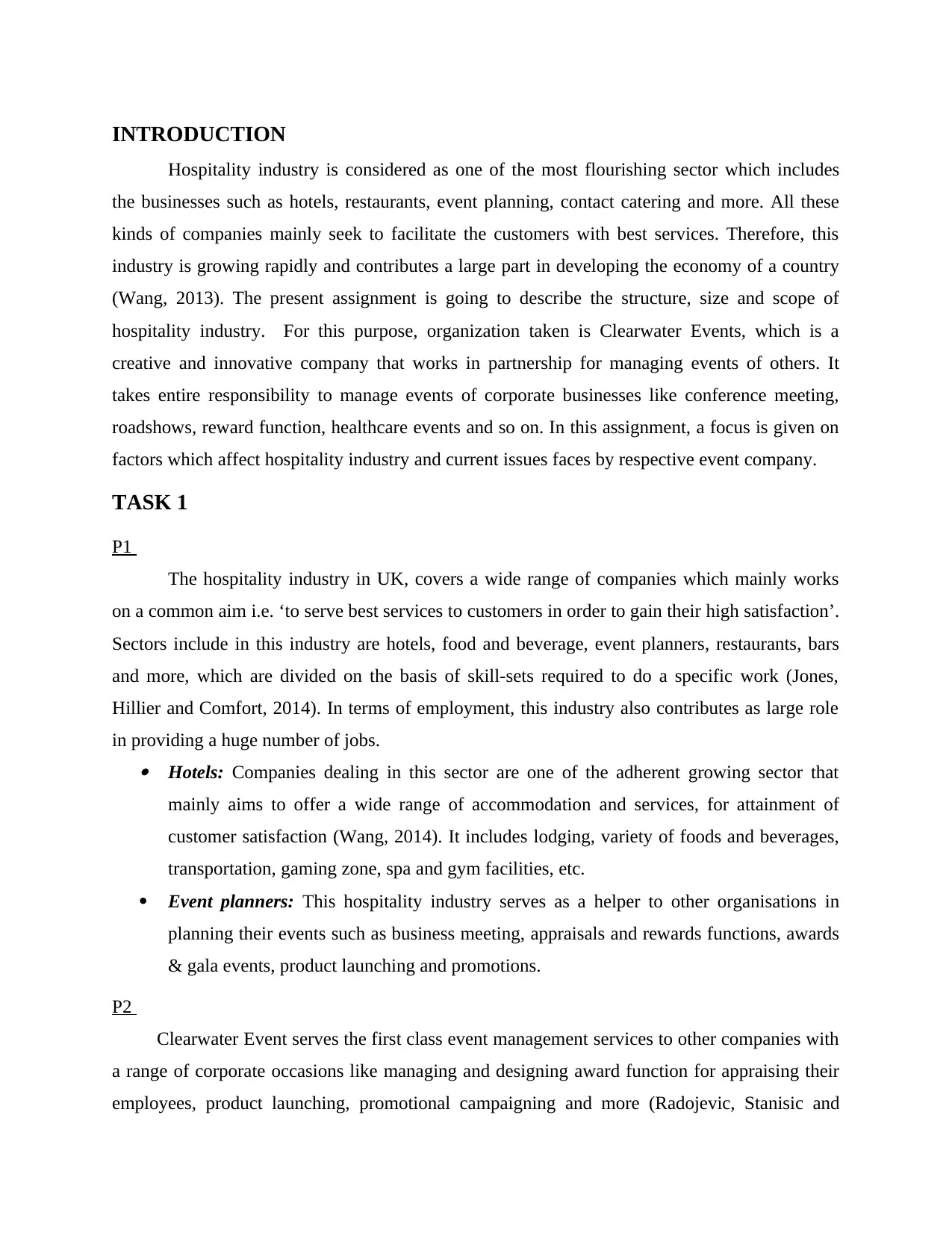
INTRODUCTION
Hospitality industry is considered as one of the most flourishing sector which includes
the businesses such as hotels, restaurants, event planning, contact catering and more. All these
kinds of companies mainly seek to facilitate the customers with best services. Therefore, this
industry is growing rapidly and contributes a large part in developing the economy of a country
(Wang, 2013). The present assignment is going to describe the structure, size and scope of
hospitality industry. For this purpose, organization taken is Clearwater Events, which is a
creative and innovative company that works in partnership for managing events of others. It
takes entire responsibility to manage events of corporate businesses like conference meeting,
roadshows, reward function, healthcare events and so on. In this assignment, a focus is given on
factors which affect hospitality industry and current issues faces by respective event company.
TASK 1
P1
The hospitality industry in UK, covers a wide range of companies which mainly works
on a common aim i.e. ‘to serve best services to customers in order to gain their high satisfaction’.
Sectors include in this industry are hotels, food and beverage, event planners, restaurants, bars
and more, which are divided on the basis of skill-sets required to do a specific work (Jones,
Hillier and Comfort, 2014). In terms of employment, this industry also contributes as large role
in providing a huge number of jobs. Hotels: Companies dealing in this sector are one of the adherent growing sector that
mainly aims to offer a wide range of accommodation and services, for attainment of
customer satisfaction (Wang, 2014). It includes lodging, variety of foods and beverages,
transportation, gaming zone, spa and gym facilities, etc.
Event planners: This hospitality industry serves as a helper to other organisations in
planning their events such as business meeting, appraisals and rewards functions, awards
& gala events, product launching and promotions.
P2
Clearwater Event serves the first class event management services to other companies with
a range of corporate occasions like managing and designing award function for appraising their
employees, product launching, promotional campaigning and more (Radojevic, Stanisic and
Hospitality industry is considered as one of the most flourishing sector which includes
the businesses such as hotels, restaurants, event planning, contact catering and more. All these
kinds of companies mainly seek to facilitate the customers with best services. Therefore, this
industry is growing rapidly and contributes a large part in developing the economy of a country
(Wang, 2013). The present assignment is going to describe the structure, size and scope of
hospitality industry. For this purpose, organization taken is Clearwater Events, which is a
creative and innovative company that works in partnership for managing events of others. It
takes entire responsibility to manage events of corporate businesses like conference meeting,
roadshows, reward function, healthcare events and so on. In this assignment, a focus is given on
factors which affect hospitality industry and current issues faces by respective event company.
TASK 1
P1
The hospitality industry in UK, covers a wide range of companies which mainly works
on a common aim i.e. ‘to serve best services to customers in order to gain their high satisfaction’.
Sectors include in this industry are hotels, food and beverage, event planners, restaurants, bars
and more, which are divided on the basis of skill-sets required to do a specific work (Jones,
Hillier and Comfort, 2014). In terms of employment, this industry also contributes as large role
in providing a huge number of jobs. Hotels: Companies dealing in this sector are one of the adherent growing sector that
mainly aims to offer a wide range of accommodation and services, for attainment of
customer satisfaction (Wang, 2014). It includes lodging, variety of foods and beverages,
transportation, gaming zone, spa and gym facilities, etc.
Event planners: This hospitality industry serves as a helper to other organisations in
planning their events such as business meeting, appraisals and rewards functions, awards
& gala events, product launching and promotions.
P2
Clearwater Event serves the first class event management services to other companies with
a range of corporate occasions like managing and designing award function for appraising their
employees, product launching, promotional campaigning and more (Radojevic, Stanisic and
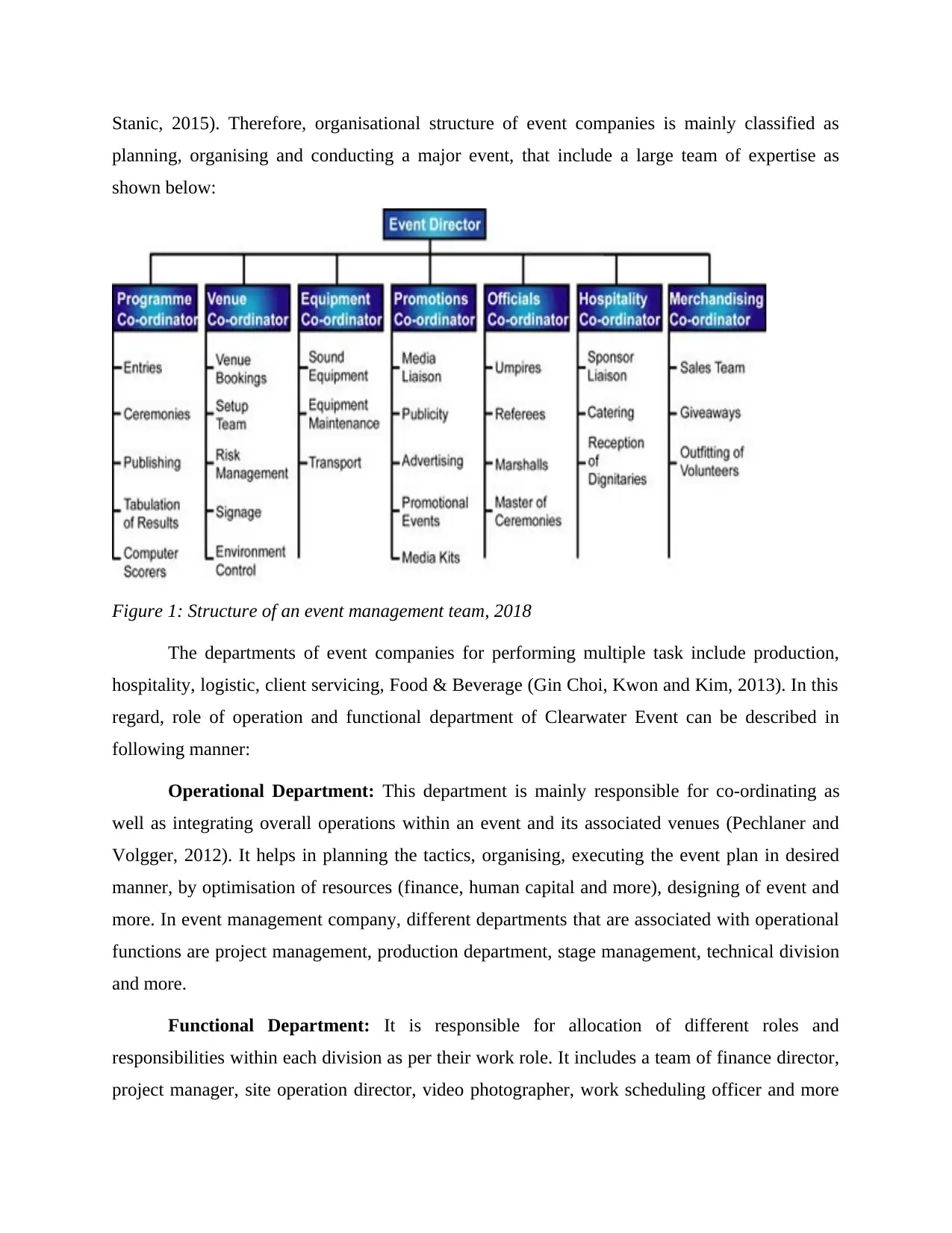
Stanic, 2015). Therefore, organisational structure of event companies is mainly classified as
planning, organising and conducting a major event, that include a large team of expertise as
shown below:
Figure 1: Structure of an event management team, 2018
The departments of event companies for performing multiple task include production,
hospitality, logistic, client servicing, Food & Beverage (Gin Choi, Kwon and Kim, 2013). In this
regard, role of operation and functional department of Clearwater Event can be described in
following manner:
Operational Department: This department is mainly responsible for co-ordinating as
well as integrating overall operations within an event and its associated venues (Pechlaner and
Volgger, 2012). It helps in planning the tactics, organising, executing the event plan in desired
manner, by optimisation of resources (finance, human capital and more), designing of event and
more. In event management company, different departments that are associated with operational
functions are project management, production department, stage management, technical division
and more.
Functional Department: It is responsible for allocation of different roles and
responsibilities within each division as per their work role. It includes a team of finance director,
project manager, site operation director, video photographer, work scheduling officer and more
planning, organising and conducting a major event, that include a large team of expertise as
shown below:
Figure 1: Structure of an event management team, 2018
The departments of event companies for performing multiple task include production,
hospitality, logistic, client servicing, Food & Beverage (Gin Choi, Kwon and Kim, 2013). In this
regard, role of operation and functional department of Clearwater Event can be described in
following manner:
Operational Department: This department is mainly responsible for co-ordinating as
well as integrating overall operations within an event and its associated venues (Pechlaner and
Volgger, 2012). It helps in planning the tactics, organising, executing the event plan in desired
manner, by optimisation of resources (finance, human capital and more), designing of event and
more. In event management company, different departments that are associated with operational
functions are project management, production department, stage management, technical division
and more.
Functional Department: It is responsible for allocation of different roles and
responsibilities within each division as per their work role. It includes a team of finance director,
project manager, site operation director, video photographer, work scheduling officer and more
Secure Best Marks with AI Grader
Need help grading? Try our AI Grader for instant feedback on your assignments.
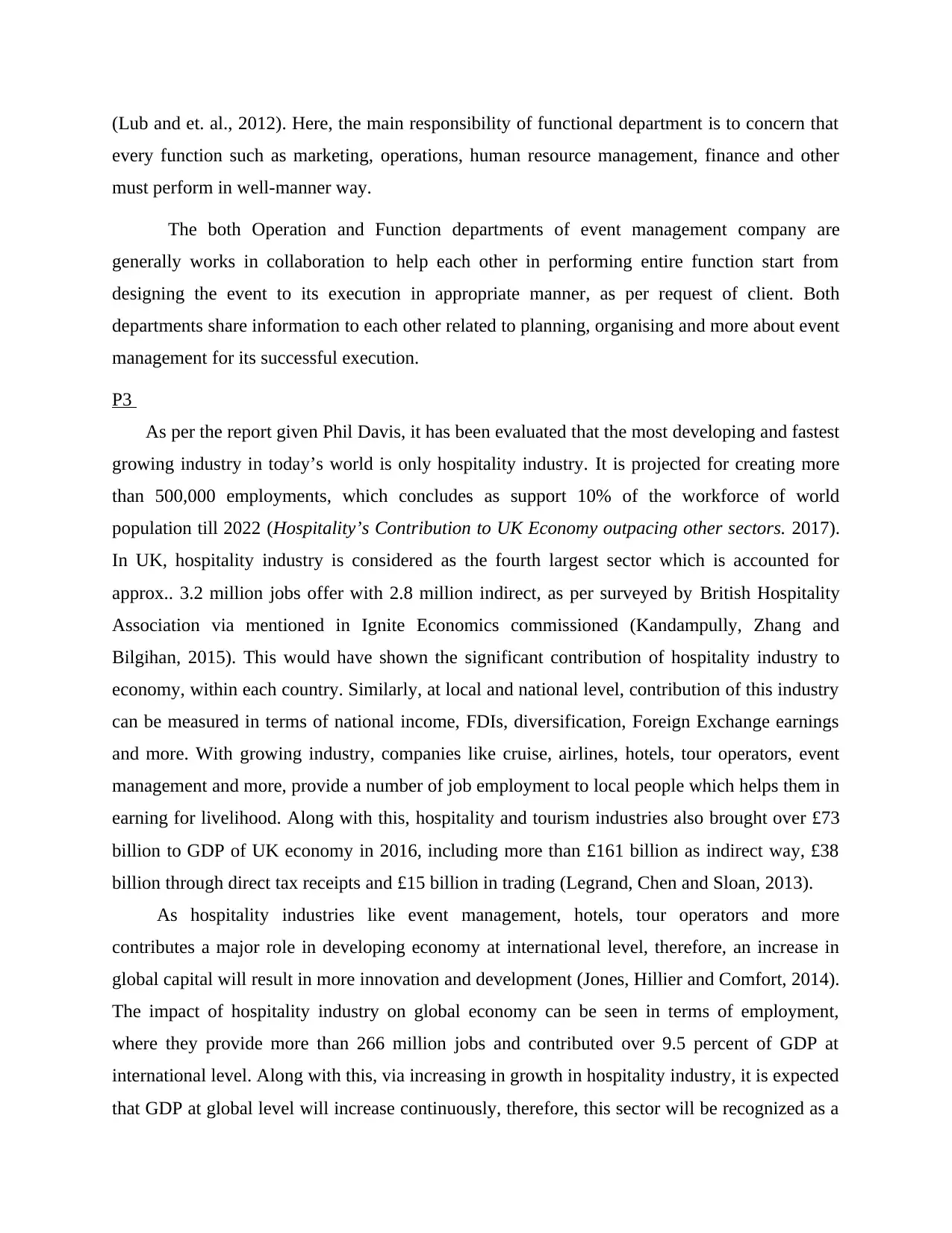
(Lub and et. al., 2012). Here, the main responsibility of functional department is to concern that
every function such as marketing, operations, human resource management, finance and other
must perform in well-manner way.
The both Operation and Function departments of event management company are
generally works in collaboration to help each other in performing entire function start from
designing the event to its execution in appropriate manner, as per request of client. Both
departments share information to each other related to planning, organising and more about event
management for its successful execution.
P3
As per the report given Phil Davis, it has been evaluated that the most developing and fastest
growing industry in today’s world is only hospitality industry. It is projected for creating more
than 500,000 employments, which concludes as support 10% of the workforce of world
population till 2022 (Hospitality’s Contribution to UK Economy outpacing other sectors. 2017).
In UK, hospitality industry is considered as the fourth largest sector which is accounted for
approx.. 3.2 million jobs offer with 2.8 million indirect, as per surveyed by British Hospitality
Association via mentioned in Ignite Economics commissioned (Kandampully, Zhang and
Bilgihan, 2015). This would have shown the significant contribution of hospitality industry to
economy, within each country. Similarly, at local and national level, contribution of this industry
can be measured in terms of national income, FDIs, diversification, Foreign Exchange earnings
and more. With growing industry, companies like cruise, airlines, hotels, tour operators, event
management and more, provide a number of job employment to local people which helps them in
earning for livelihood. Along with this, hospitality and tourism industries also brought over £73
billion to GDP of UK economy in 2016, including more than £161 billion as indirect way, £38
billion through direct tax receipts and £15 billion in trading (Legrand, Chen and Sloan, 2013).
As hospitality industries like event management, hotels, tour operators and more
contributes a major role in developing economy at international level, therefore, an increase in
global capital will result in more innovation and development (Jones, Hillier and Comfort, 2014).
The impact of hospitality industry on global economy can be seen in terms of employment,
where they provide more than 266 million jobs and contributed over 9.5 percent of GDP at
international level. Along with this, via increasing in growth in hospitality industry, it is expected
that GDP at global level will increase continuously, therefore, this sector will be recognized as a
every function such as marketing, operations, human resource management, finance and other
must perform in well-manner way.
The both Operation and Function departments of event management company are
generally works in collaboration to help each other in performing entire function start from
designing the event to its execution in appropriate manner, as per request of client. Both
departments share information to each other related to planning, organising and more about event
management for its successful execution.
P3
As per the report given Phil Davis, it has been evaluated that the most developing and fastest
growing industry in today’s world is only hospitality industry. It is projected for creating more
than 500,000 employments, which concludes as support 10% of the workforce of world
population till 2022 (Hospitality’s Contribution to UK Economy outpacing other sectors. 2017).
In UK, hospitality industry is considered as the fourth largest sector which is accounted for
approx.. 3.2 million jobs offer with 2.8 million indirect, as per surveyed by British Hospitality
Association via mentioned in Ignite Economics commissioned (Kandampully, Zhang and
Bilgihan, 2015). This would have shown the significant contribution of hospitality industry to
economy, within each country. Similarly, at local and national level, contribution of this industry
can be measured in terms of national income, FDIs, diversification, Foreign Exchange earnings
and more. With growing industry, companies like cruise, airlines, hotels, tour operators, event
management and more, provide a number of job employment to local people which helps them in
earning for livelihood. Along with this, hospitality and tourism industries also brought over £73
billion to GDP of UK economy in 2016, including more than £161 billion as indirect way, £38
billion through direct tax receipts and £15 billion in trading (Legrand, Chen and Sloan, 2013).
As hospitality industries like event management, hotels, tour operators and more
contributes a major role in developing economy at international level, therefore, an increase in
global capital will result in more innovation and development (Jones, Hillier and Comfort, 2014).
The impact of hospitality industry on global economy can be seen in terms of employment,
where they provide more than 266 million jobs and contributed over 9.5 percent of GDP at
international level. Along with this, via increasing in growth in hospitality industry, it is expected
that GDP at global level will increase continuously, therefore, this sector will be recognized as a
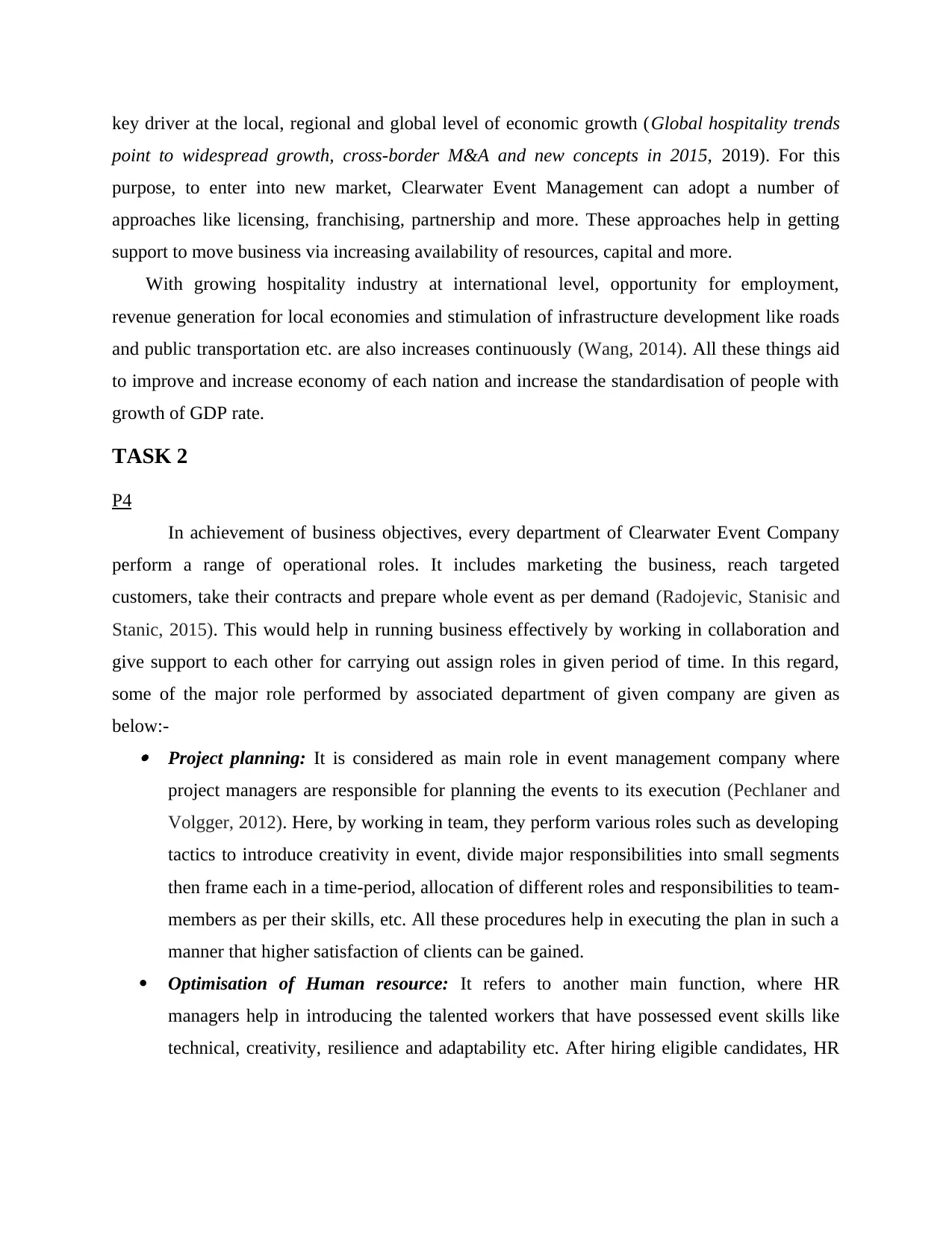
key driver at the local, regional and global level of economic growth (Global hospitality trends
point to widespread growth, cross-border M&A and new concepts in 2015, 2019). For this
purpose, to enter into new market, Clearwater Event Management can adopt a number of
approaches like licensing, franchising, partnership and more. These approaches help in getting
support to move business via increasing availability of resources, capital and more.
With growing hospitality industry at international level, opportunity for employment,
revenue generation for local economies and stimulation of infrastructure development like roads
and public transportation etc. are also increases continuously (Wang, 2014). All these things aid
to improve and increase economy of each nation and increase the standardisation of people with
growth of GDP rate.
TASK 2
P4
In achievement of business objectives, every department of Clearwater Event Company
perform a range of operational roles. It includes marketing the business, reach targeted
customers, take their contracts and prepare whole event as per demand (Radojevic, Stanisic and
Stanic, 2015). This would help in running business effectively by working in collaboration and
give support to each other for carrying out assign roles in given period of time. In this regard,
some of the major role performed by associated department of given company are given as
below:- Project planning: It is considered as main role in event management company where
project managers are responsible for planning the events to its execution (Pechlaner and
Volgger, 2012). Here, by working in team, they perform various roles such as developing
tactics to introduce creativity in event, divide major responsibilities into small segments
then frame each in a time-period, allocation of different roles and responsibilities to team-
members as per their skills, etc. All these procedures help in executing the plan in such a
manner that higher satisfaction of clients can be gained.
Optimisation of Human resource: It refers to another main function, where HR
managers help in introducing the talented workers that have possessed event skills like
technical, creativity, resilience and adaptability etc. After hiring eligible candidates, HR
point to widespread growth, cross-border M&A and new concepts in 2015, 2019). For this
purpose, to enter into new market, Clearwater Event Management can adopt a number of
approaches like licensing, franchising, partnership and more. These approaches help in getting
support to move business via increasing availability of resources, capital and more.
With growing hospitality industry at international level, opportunity for employment,
revenue generation for local economies and stimulation of infrastructure development like roads
and public transportation etc. are also increases continuously (Wang, 2014). All these things aid
to improve and increase economy of each nation and increase the standardisation of people with
growth of GDP rate.
TASK 2
P4
In achievement of business objectives, every department of Clearwater Event Company
perform a range of operational roles. It includes marketing the business, reach targeted
customers, take their contracts and prepare whole event as per demand (Radojevic, Stanisic and
Stanic, 2015). This would help in running business effectively by working in collaboration and
give support to each other for carrying out assign roles in given period of time. In this regard,
some of the major role performed by associated department of given company are given as
below:- Project planning: It is considered as main role in event management company where
project managers are responsible for planning the events to its execution (Pechlaner and
Volgger, 2012). Here, by working in team, they perform various roles such as developing
tactics to introduce creativity in event, divide major responsibilities into small segments
then frame each in a time-period, allocation of different roles and responsibilities to team-
members as per their skills, etc. All these procedures help in executing the plan in such a
manner that higher satisfaction of clients can be gained.
Optimisation of Human resource: It refers to another main function, where HR
managers help in introducing the talented workers that have possessed event skills like
technical, creativity, resilience and adaptability etc. After hiring eligible candidates, HR
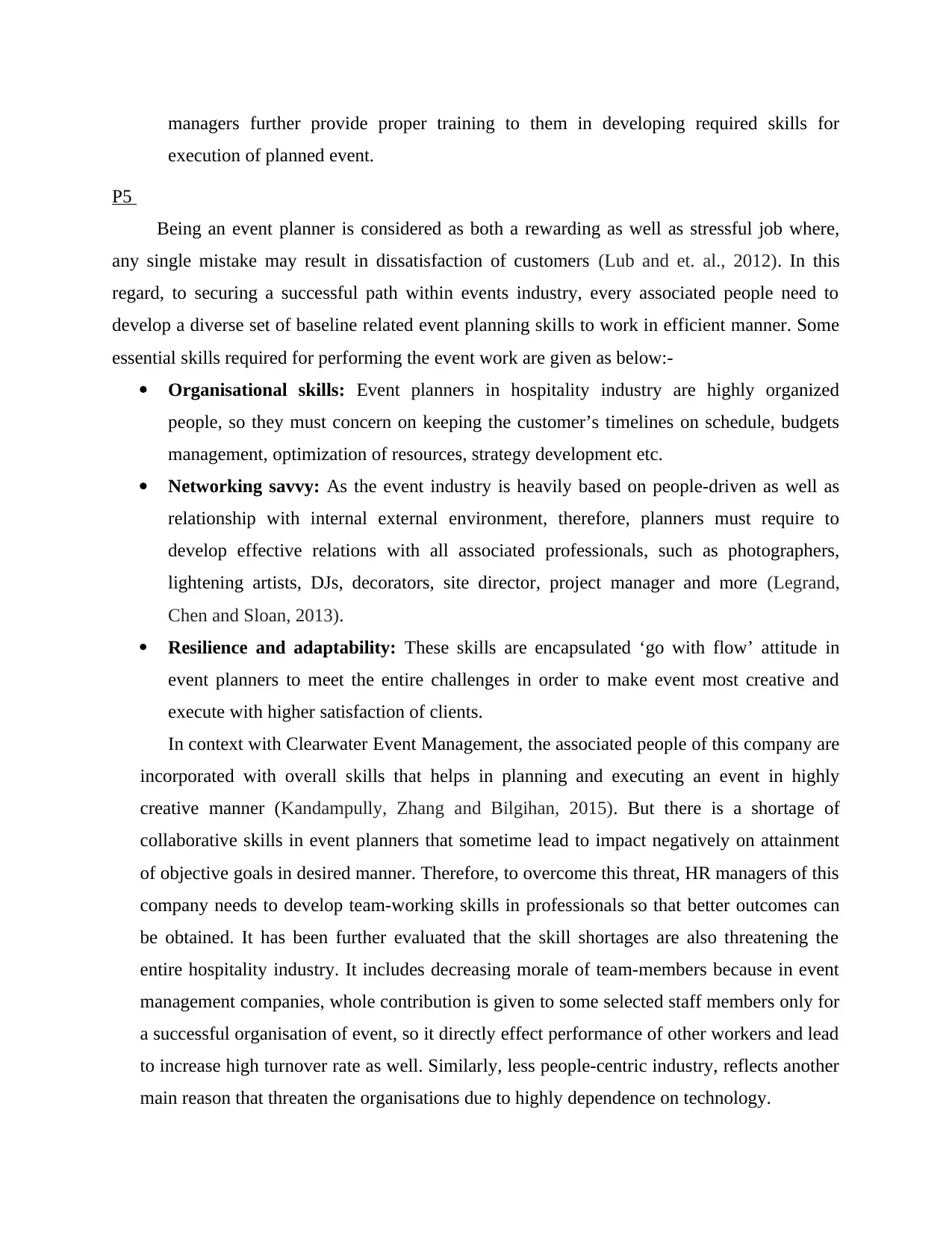
managers further provide proper training to them in developing required skills for
execution of planned event.
P5
Being an event planner is considered as both a rewarding as well as stressful job where,
any single mistake may result in dissatisfaction of customers (Lub and et. al., 2012). In this
regard, to securing a successful path within events industry, every associated people need to
develop a diverse set of baseline related event planning skills to work in efficient manner. Some
essential skills required for performing the event work are given as below:-
Organisational skills: Event planners in hospitality industry are highly organized
people, so they must concern on keeping the customer’s timelines on schedule, budgets
management, optimization of resources, strategy development etc.
Networking savvy: As the event industry is heavily based on people-driven as well as
relationship with internal external environment, therefore, planners must require to
develop effective relations with all associated professionals, such as photographers,
lightening artists, DJs, decorators, site director, project manager and more (Legrand,
Chen and Sloan, 2013).
Resilience and adaptability: These skills are encapsulated ‘go with flow’ attitude in
event planners to meet the entire challenges in order to make event most creative and
execute with higher satisfaction of clients.
In context with Clearwater Event Management, the associated people of this company are
incorporated with overall skills that helps in planning and executing an event in highly
creative manner (Kandampully, Zhang and Bilgihan, 2015). But there is a shortage of
collaborative skills in event planners that sometime lead to impact negatively on attainment
of objective goals in desired manner. Therefore, to overcome this threat, HR managers of this
company needs to develop team-working skills in professionals so that better outcomes can
be obtained. It has been further evaluated that the skill shortages are also threatening the
entire hospitality industry. It includes decreasing morale of team-members because in event
management companies, whole contribution is given to some selected staff members only for
a successful organisation of event, so it directly effect performance of other workers and lead
to increase high turnover rate as well. Similarly, less people-centric industry, reflects another
main reason that threaten the organisations due to highly dependence on technology.
execution of planned event.
P5
Being an event planner is considered as both a rewarding as well as stressful job where,
any single mistake may result in dissatisfaction of customers (Lub and et. al., 2012). In this
regard, to securing a successful path within events industry, every associated people need to
develop a diverse set of baseline related event planning skills to work in efficient manner. Some
essential skills required for performing the event work are given as below:-
Organisational skills: Event planners in hospitality industry are highly organized
people, so they must concern on keeping the customer’s timelines on schedule, budgets
management, optimization of resources, strategy development etc.
Networking savvy: As the event industry is heavily based on people-driven as well as
relationship with internal external environment, therefore, planners must require to
develop effective relations with all associated professionals, such as photographers,
lightening artists, DJs, decorators, site director, project manager and more (Legrand,
Chen and Sloan, 2013).
Resilience and adaptability: These skills are encapsulated ‘go with flow’ attitude in
event planners to meet the entire challenges in order to make event most creative and
execute with higher satisfaction of clients.
In context with Clearwater Event Management, the associated people of this company are
incorporated with overall skills that helps in planning and executing an event in highly
creative manner (Kandampully, Zhang and Bilgihan, 2015). But there is a shortage of
collaborative skills in event planners that sometime lead to impact negatively on attainment
of objective goals in desired manner. Therefore, to overcome this threat, HR managers of this
company needs to develop team-working skills in professionals so that better outcomes can
be obtained. It has been further evaluated that the skill shortages are also threatening the
entire hospitality industry. It includes decreasing morale of team-members because in event
management companies, whole contribution is given to some selected staff members only for
a successful organisation of event, so it directly effect performance of other workers and lead
to increase high turnover rate as well. Similarly, less people-centric industry, reflects another
main reason that threaten the organisations due to highly dependence on technology.
Paraphrase This Document
Need a fresh take? Get an instant paraphrase of this document with our AI Paraphraser
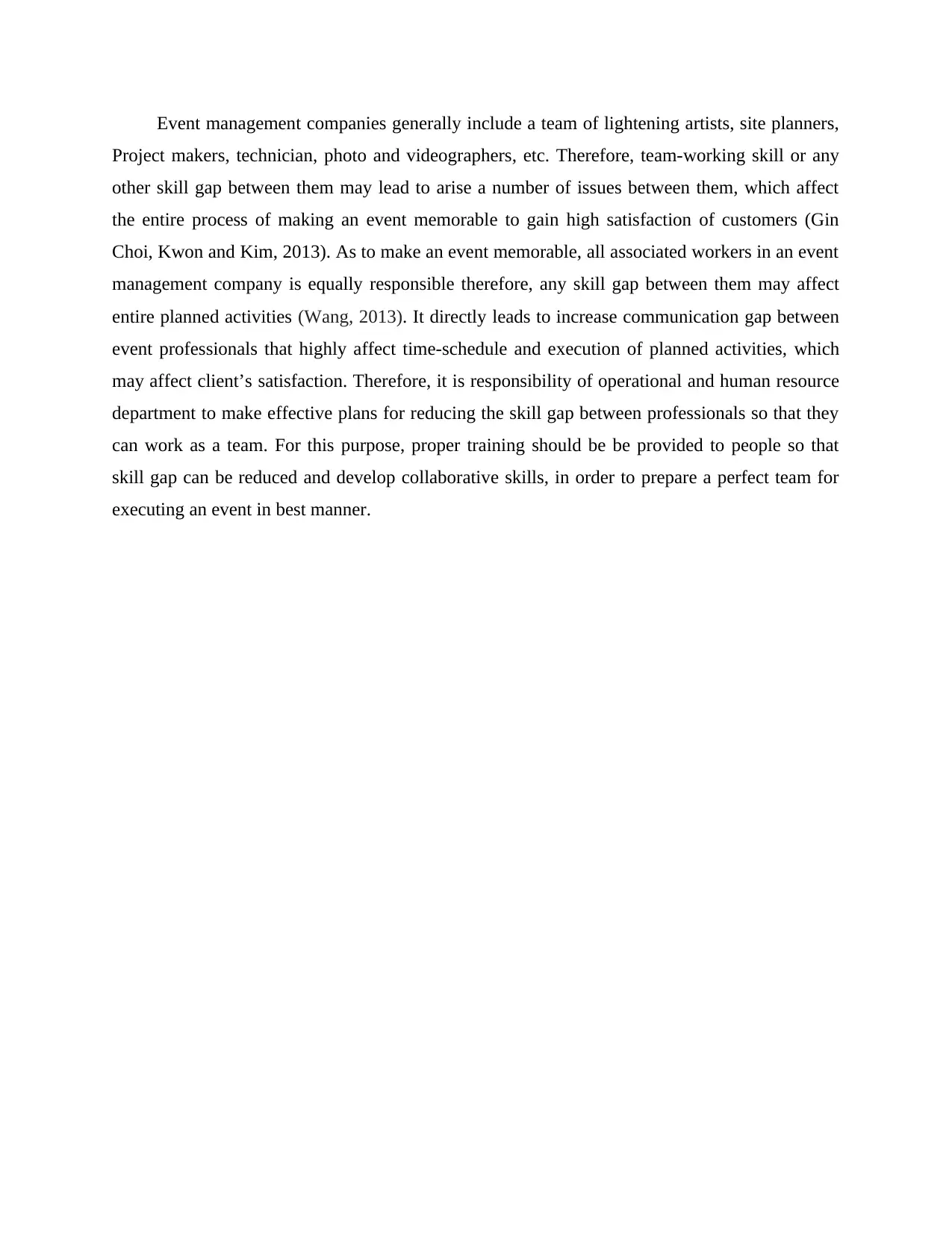
Event management companies generally include a team of lightening artists, site planners,
Project makers, technician, photo and videographers, etc. Therefore, team-working skill or any
other skill gap between them may lead to arise a number of issues between them, which affect
the entire process of making an event memorable to gain high satisfaction of customers (Gin
Choi, Kwon and Kim, 2013). As to make an event memorable, all associated workers in an event
management company is equally responsible therefore, any skill gap between them may affect
entire planned activities (Wang, 2013). It directly leads to increase communication gap between
event professionals that highly affect time-schedule and execution of planned activities, which
may affect client’s satisfaction. Therefore, it is responsibility of operational and human resource
department to make effective plans for reducing the skill gap between professionals so that they
can work as a team. For this purpose, proper training should be be provided to people so that
skill gap can be reduced and develop collaborative skills, in order to prepare a perfect team for
executing an event in best manner.
Project makers, technician, photo and videographers, etc. Therefore, team-working skill or any
other skill gap between them may lead to arise a number of issues between them, which affect
the entire process of making an event memorable to gain high satisfaction of customers (Gin
Choi, Kwon and Kim, 2013). As to make an event memorable, all associated workers in an event
management company is equally responsible therefore, any skill gap between them may affect
entire planned activities (Wang, 2013). It directly leads to increase communication gap between
event professionals that highly affect time-schedule and execution of planned activities, which
may affect client’s satisfaction. Therefore, it is responsibility of operational and human resource
department to make effective plans for reducing the skill gap between professionals so that they
can work as a team. For this purpose, proper training should be be provided to people so that
skill gap can be reduced and develop collaborative skills, in order to prepare a perfect team for
executing an event in best manner.
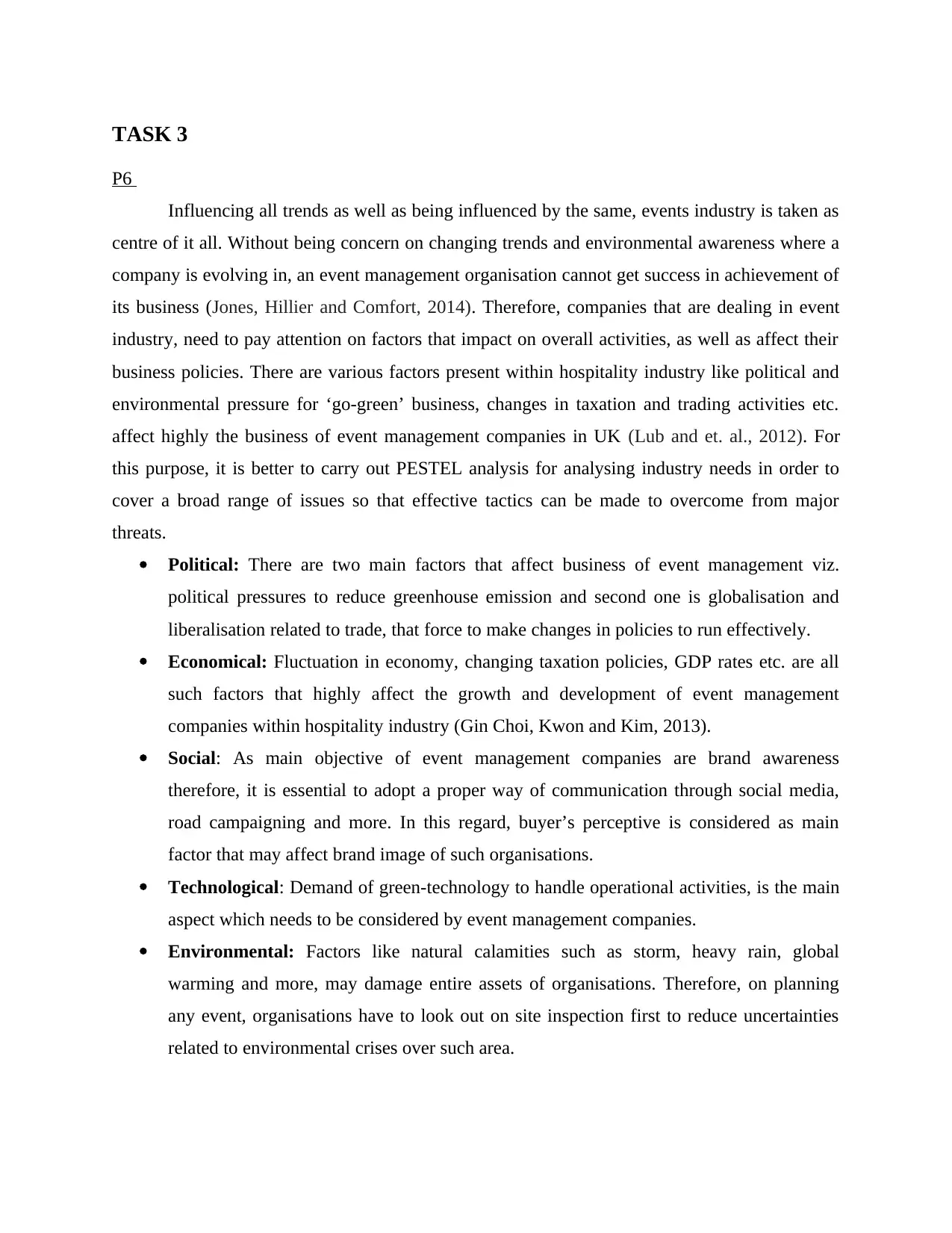
TASK 3
P6
Influencing all trends as well as being influenced by the same, events industry is taken as
centre of it all. Without being concern on changing trends and environmental awareness where a
company is evolving in, an event management organisation cannot get success in achievement of
its business (Jones, Hillier and Comfort, 2014). Therefore, companies that are dealing in event
industry, need to pay attention on factors that impact on overall activities, as well as affect their
business policies. There are various factors present within hospitality industry like political and
environmental pressure for ‘go-green’ business, changes in taxation and trading activities etc.
affect highly the business of event management companies in UK (Lub and et. al., 2012). For
this purpose, it is better to carry out PESTEL analysis for analysing industry needs in order to
cover a broad range of issues so that effective tactics can be made to overcome from major
threats.
Political: There are two main factors that affect business of event management viz.
political pressures to reduce greenhouse emission and second one is globalisation and
liberalisation related to trade, that force to make changes in policies to run effectively.
Economical: Fluctuation in economy, changing taxation policies, GDP rates etc. are all
such factors that highly affect the growth and development of event management
companies within hospitality industry (Gin Choi, Kwon and Kim, 2013).
Social: As main objective of event management companies are brand awareness
therefore, it is essential to adopt a proper way of communication through social media,
road campaigning and more. In this regard, buyer’s perceptive is considered as main
factor that may affect brand image of such organisations.
Technological: Demand of green-technology to handle operational activities, is the main
aspect which needs to be considered by event management companies.
Environmental: Factors like natural calamities such as storm, heavy rain, global
warming and more, may damage entire assets of organisations. Therefore, on planning
any event, organisations have to look out on site inspection first to reduce uncertainties
related to environmental crises over such area.
P6
Influencing all trends as well as being influenced by the same, events industry is taken as
centre of it all. Without being concern on changing trends and environmental awareness where a
company is evolving in, an event management organisation cannot get success in achievement of
its business (Jones, Hillier and Comfort, 2014). Therefore, companies that are dealing in event
industry, need to pay attention on factors that impact on overall activities, as well as affect their
business policies. There are various factors present within hospitality industry like political and
environmental pressure for ‘go-green’ business, changes in taxation and trading activities etc.
affect highly the business of event management companies in UK (Lub and et. al., 2012). For
this purpose, it is better to carry out PESTEL analysis for analysing industry needs in order to
cover a broad range of issues so that effective tactics can be made to overcome from major
threats.
Political: There are two main factors that affect business of event management viz.
political pressures to reduce greenhouse emission and second one is globalisation and
liberalisation related to trade, that force to make changes in policies to run effectively.
Economical: Fluctuation in economy, changing taxation policies, GDP rates etc. are all
such factors that highly affect the growth and development of event management
companies within hospitality industry (Gin Choi, Kwon and Kim, 2013).
Social: As main objective of event management companies are brand awareness
therefore, it is essential to adopt a proper way of communication through social media,
road campaigning and more. In this regard, buyer’s perceptive is considered as main
factor that may affect brand image of such organisations.
Technological: Demand of green-technology to handle operational activities, is the main
aspect which needs to be considered by event management companies.
Environmental: Factors like natural calamities such as storm, heavy rain, global
warming and more, may damage entire assets of organisations. Therefore, on planning
any event, organisations have to look out on site inspection first to reduce uncertainties
related to environmental crises over such area.
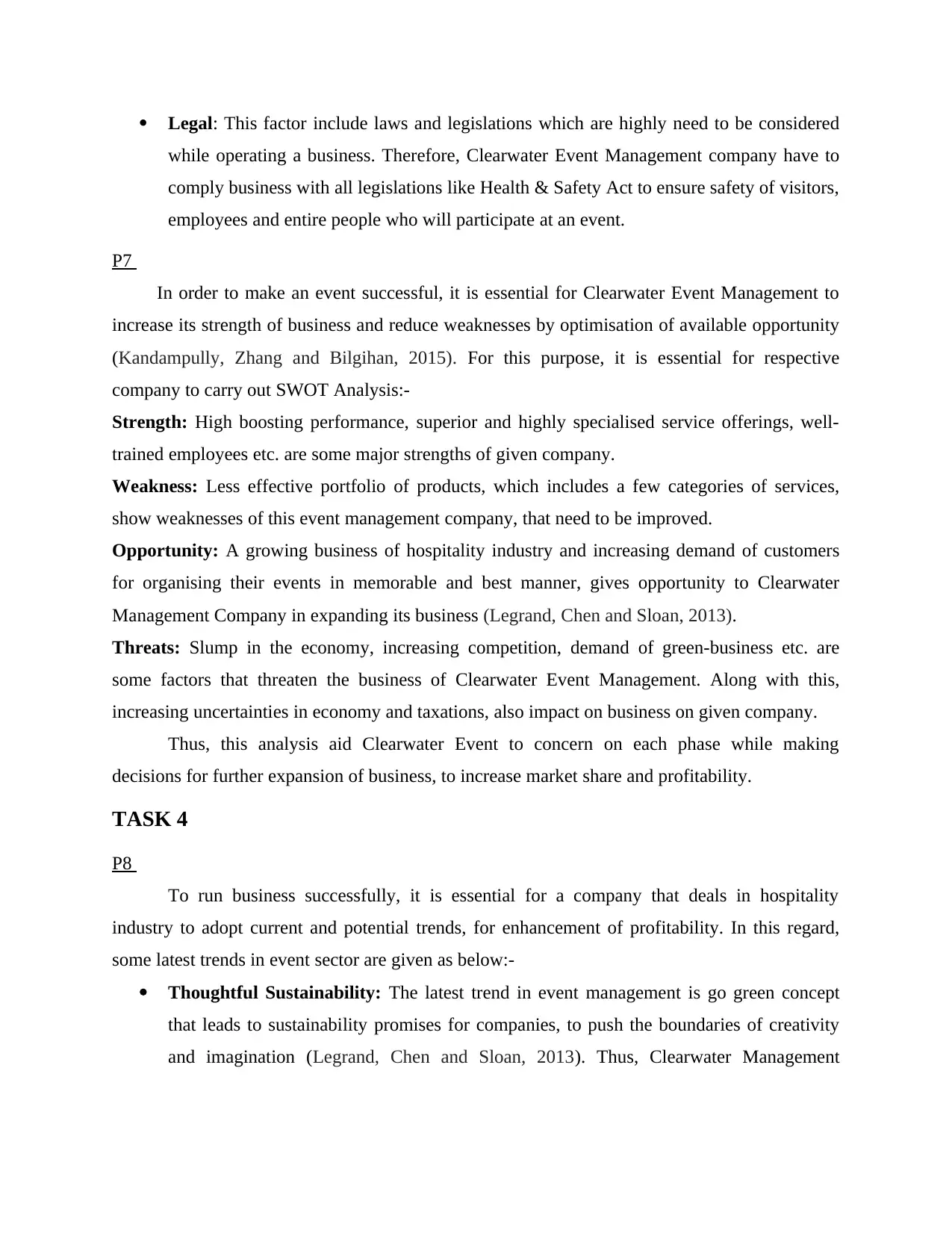
Legal: This factor include laws and legislations which are highly need to be considered
while operating a business. Therefore, Clearwater Event Management company have to
comply business with all legislations like Health & Safety Act to ensure safety of visitors,
employees and entire people who will participate at an event.
P7
In order to make an event successful, it is essential for Clearwater Event Management to
increase its strength of business and reduce weaknesses by optimisation of available opportunity
(Kandampully, Zhang and Bilgihan, 2015). For this purpose, it is essential for respective
company to carry out SWOT Analysis:-
Strength: High boosting performance, superior and highly specialised service offerings, well-
trained employees etc. are some major strengths of given company.
Weakness: Less effective portfolio of products, which includes a few categories of services,
show weaknesses of this event management company, that need to be improved.
Opportunity: A growing business of hospitality industry and increasing demand of customers
for organising their events in memorable and best manner, gives opportunity to Clearwater
Management Company in expanding its business (Legrand, Chen and Sloan, 2013).
Threats: Slump in the economy, increasing competition, demand of green-business etc. are
some factors that threaten the business of Clearwater Event Management. Along with this,
increasing uncertainties in economy and taxations, also impact on business on given company.
Thus, this analysis aid Clearwater Event to concern on each phase while making
decisions for further expansion of business, to increase market share and profitability.
TASK 4
P8
To run business successfully, it is essential for a company that deals in hospitality
industry to adopt current and potential trends, for enhancement of profitability. In this regard,
some latest trends in event sector are given as below:-
Thoughtful Sustainability: The latest trend in event management is go green concept
that leads to sustainability promises for companies, to push the boundaries of creativity
and imagination (Legrand, Chen and Sloan, 2013). Thus, Clearwater Management
while operating a business. Therefore, Clearwater Event Management company have to
comply business with all legislations like Health & Safety Act to ensure safety of visitors,
employees and entire people who will participate at an event.
P7
In order to make an event successful, it is essential for Clearwater Event Management to
increase its strength of business and reduce weaknesses by optimisation of available opportunity
(Kandampully, Zhang and Bilgihan, 2015). For this purpose, it is essential for respective
company to carry out SWOT Analysis:-
Strength: High boosting performance, superior and highly specialised service offerings, well-
trained employees etc. are some major strengths of given company.
Weakness: Less effective portfolio of products, which includes a few categories of services,
show weaknesses of this event management company, that need to be improved.
Opportunity: A growing business of hospitality industry and increasing demand of customers
for organising their events in memorable and best manner, gives opportunity to Clearwater
Management Company in expanding its business (Legrand, Chen and Sloan, 2013).
Threats: Slump in the economy, increasing competition, demand of green-business etc. are
some factors that threaten the business of Clearwater Event Management. Along with this,
increasing uncertainties in economy and taxations, also impact on business on given company.
Thus, this analysis aid Clearwater Event to concern on each phase while making
decisions for further expansion of business, to increase market share and profitability.
TASK 4
P8
To run business successfully, it is essential for a company that deals in hospitality
industry to adopt current and potential trends, for enhancement of profitability. In this regard,
some latest trends in event sector are given as below:-
Thoughtful Sustainability: The latest trend in event management is go green concept
that leads to sustainability promises for companies, to push the boundaries of creativity
and imagination (Legrand, Chen and Sloan, 2013). Thus, Clearwater Management
Secure Best Marks with AI Grader
Need help grading? Try our AI Grader for instant feedback on your assignments.
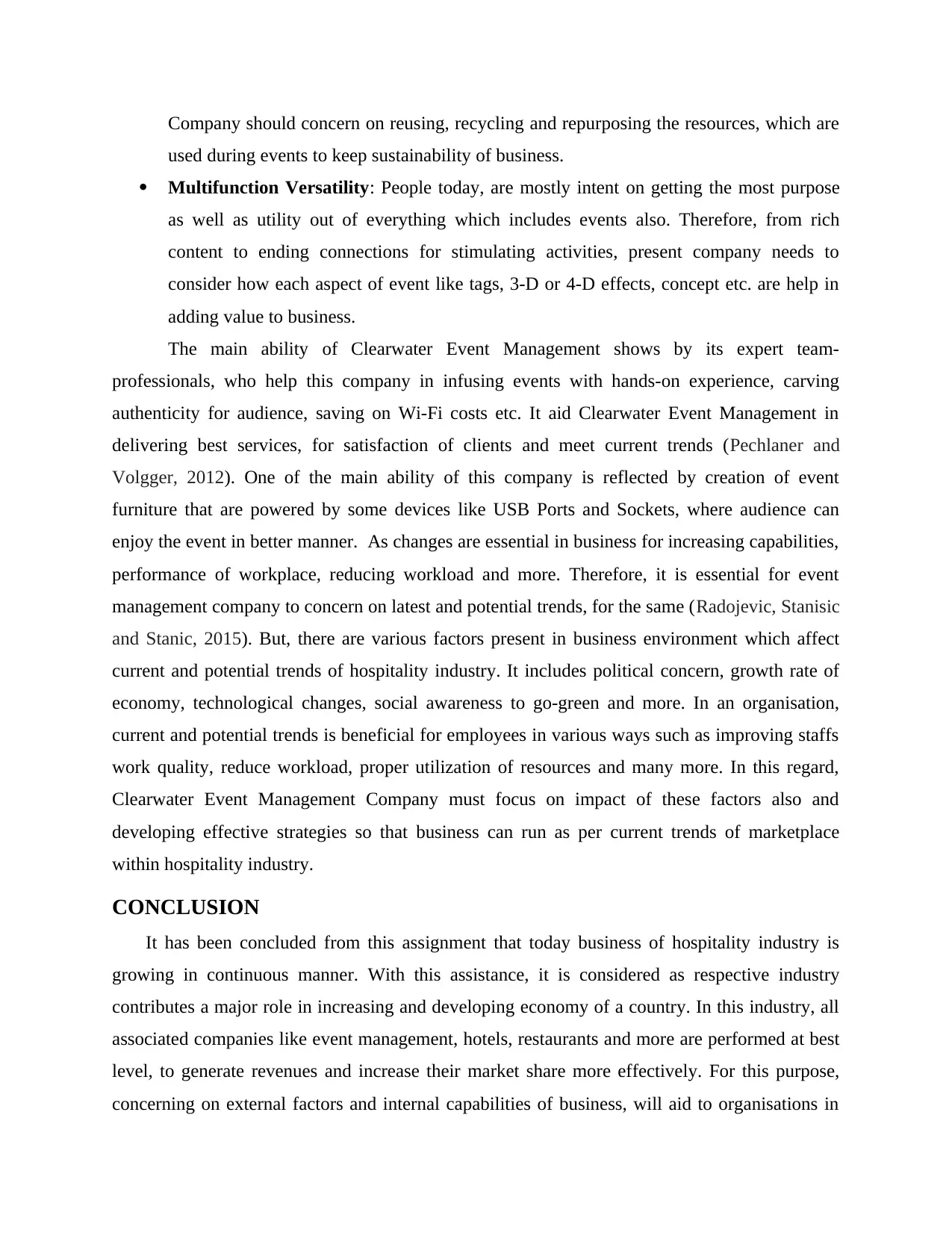
Company should concern on reusing, recycling and repurposing the resources, which are
used during events to keep sustainability of business.
Multifunction Versatility: People today, are mostly intent on getting the most purpose
as well as utility out of everything which includes events also. Therefore, from rich
content to ending connections for stimulating activities, present company needs to
consider how each aspect of event like tags, 3-D or 4-D effects, concept etc. are help in
adding value to business.
The main ability of Clearwater Event Management shows by its expert team-
professionals, who help this company in infusing events with hands-on experience, carving
authenticity for audience, saving on Wi-Fi costs etc. It aid Clearwater Event Management in
delivering best services, for satisfaction of clients and meet current trends (Pechlaner and
Volgger, 2012). One of the main ability of this company is reflected by creation of event
furniture that are powered by some devices like USB Ports and Sockets, where audience can
enjoy the event in better manner. As changes are essential in business for increasing capabilities,
performance of workplace, reducing workload and more. Therefore, it is essential for event
management company to concern on latest and potential trends, for the same (Radojevic, Stanisic
and Stanic, 2015). But, there are various factors present in business environment which affect
current and potential trends of hospitality industry. It includes political concern, growth rate of
economy, technological changes, social awareness to go-green and more. In an organisation,
current and potential trends is beneficial for employees in various ways such as improving staffs
work quality, reduce workload, proper utilization of resources and many more. In this regard,
Clearwater Event Management Company must focus on impact of these factors also and
developing effective strategies so that business can run as per current trends of marketplace
within hospitality industry.
CONCLUSION
It has been concluded from this assignment that today business of hospitality industry is
growing in continuous manner. With this assistance, it is considered as respective industry
contributes a major role in increasing and developing economy of a country. In this industry, all
associated companies like event management, hotels, restaurants and more are performed at best
level, to generate revenues and increase their market share more effectively. For this purpose,
concerning on external factors and internal capabilities of business, will aid to organisations in
used during events to keep sustainability of business.
Multifunction Versatility: People today, are mostly intent on getting the most purpose
as well as utility out of everything which includes events also. Therefore, from rich
content to ending connections for stimulating activities, present company needs to
consider how each aspect of event like tags, 3-D or 4-D effects, concept etc. are help in
adding value to business.
The main ability of Clearwater Event Management shows by its expert team-
professionals, who help this company in infusing events with hands-on experience, carving
authenticity for audience, saving on Wi-Fi costs etc. It aid Clearwater Event Management in
delivering best services, for satisfaction of clients and meet current trends (Pechlaner and
Volgger, 2012). One of the main ability of this company is reflected by creation of event
furniture that are powered by some devices like USB Ports and Sockets, where audience can
enjoy the event in better manner. As changes are essential in business for increasing capabilities,
performance of workplace, reducing workload and more. Therefore, it is essential for event
management company to concern on latest and potential trends, for the same (Radojevic, Stanisic
and Stanic, 2015). But, there are various factors present in business environment which affect
current and potential trends of hospitality industry. It includes political concern, growth rate of
economy, technological changes, social awareness to go-green and more. In an organisation,
current and potential trends is beneficial for employees in various ways such as improving staffs
work quality, reduce workload, proper utilization of resources and many more. In this regard,
Clearwater Event Management Company must focus on impact of these factors also and
developing effective strategies so that business can run as per current trends of marketplace
within hospitality industry.
CONCLUSION
It has been concluded from this assignment that today business of hospitality industry is
growing in continuous manner. With this assistance, it is considered as respective industry
contributes a major role in increasing and developing economy of a country. In this industry, all
associated companies like event management, hotels, restaurants and more are performed at best
level, to generate revenues and increase their market share more effectively. For this purpose,
concerning on external factors and internal capabilities of business, will aid to organisations in

expanding business more effectively. Along with this, it is also essential for enterprises to make
changes in business as potential and current trends of business. This would help in getting high
competitive advantages as well as increasing market share as well. For this purpose, company
also need to improve and increase skill set and knowledge of its workers, in order to gain their
high contribution in attainment of business objectives, in given period of time.
changes in business as potential and current trends of business. This would help in getting high
competitive advantages as well as increasing market share as well. For this purpose, company
also need to improve and increase skill set and knowledge of its workers, in order to gain their
high contribution in attainment of business objectives, in given period of time.
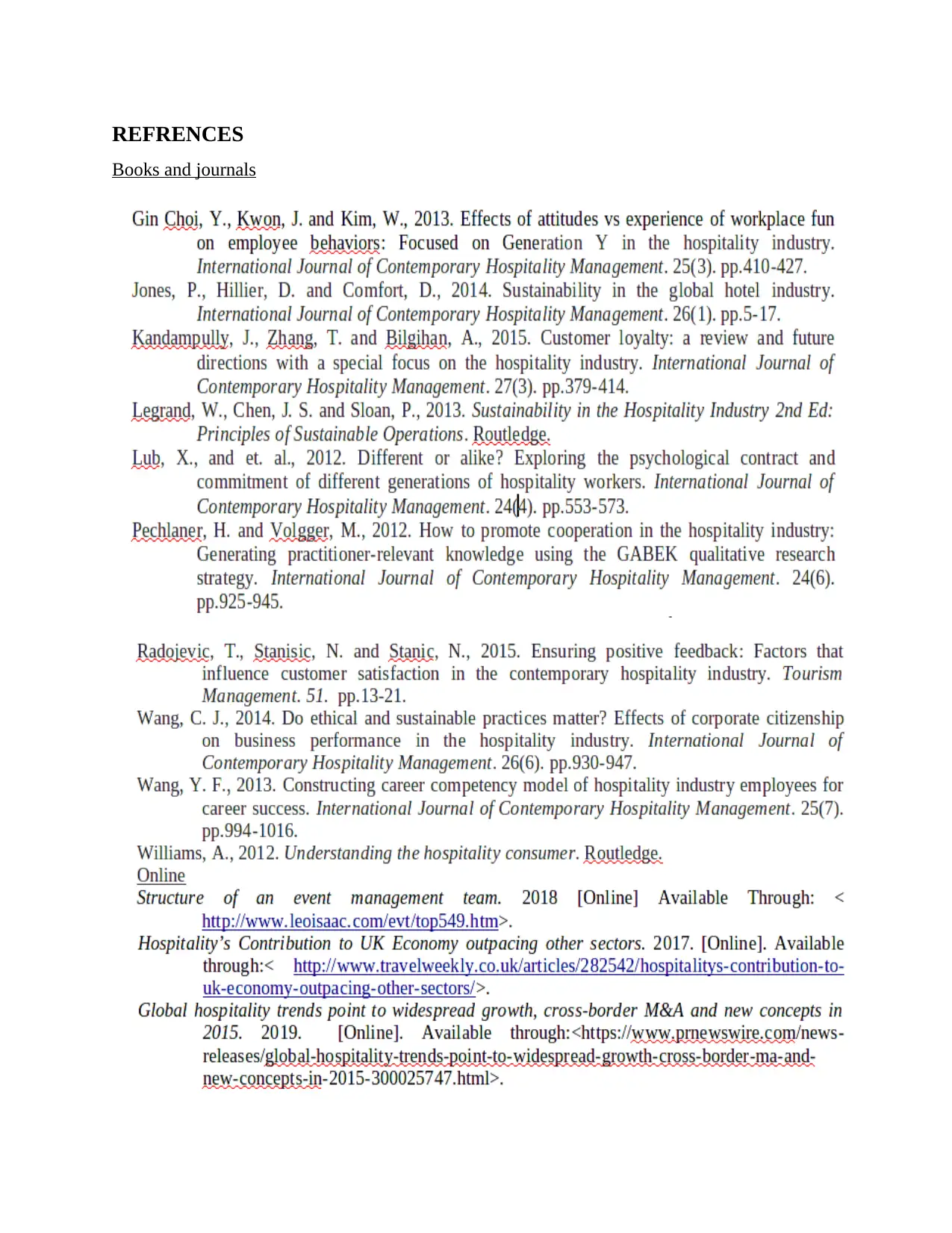
REFRENCES
Books and journals
Books and journals
1 out of 13
Your All-in-One AI-Powered Toolkit for Academic Success.
+13062052269
info@desklib.com
Available 24*7 on WhatsApp / Email
![[object Object]](/_next/static/media/star-bottom.7253800d.svg)
Unlock your academic potential
© 2024 | Zucol Services PVT LTD | All rights reserved.





